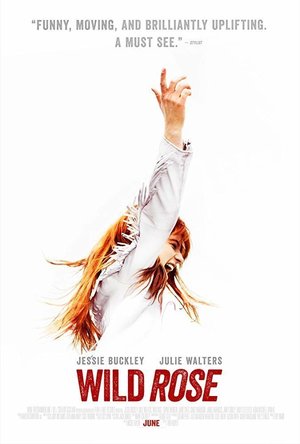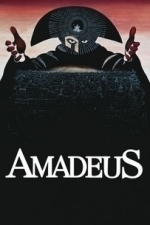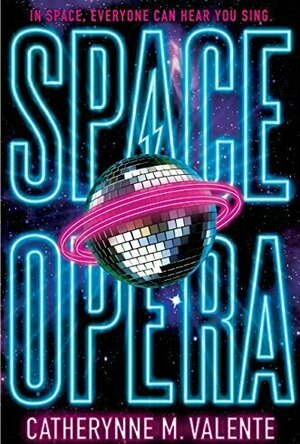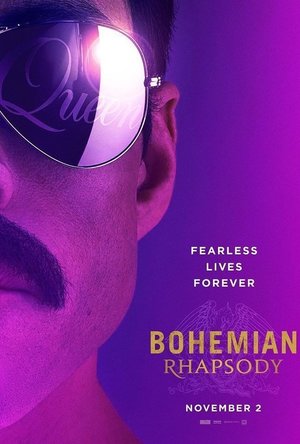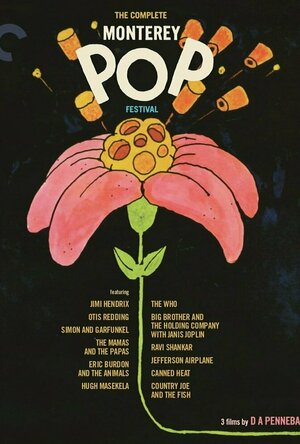
Gypsy Jazz Guitar Secrets Magazine - Learn To Play Guitar Like Django Reinhardt
Music and Magazines & Newspapers
App
*WHAT PEOPLE THINK* 5-Stars: "If you play guitar, it's practically a crime not to check this out!...
Bob Mann (459 KP) rated Wild Rose (2018) in Movies
Sep 28, 2021
Buckley plays Glaswegian Rose-Lynn Harlan, a decidedly wild child electronically tagged and released from the clink but straight down to some very public cowgirl sex with her erstwhile boyfriend. Only then does she have the afterthought of going round to the house of her Mum (Julie Walters) where two young children live. For Rose-Lynn is a single mum of two (#needs-to-be-more-careful-with-the-cowgirl-stuff), and the emotional damage metered out to the youngsters from her wayward life is fully evident.
Rose-Lynn is a frustrated ‘country-and-weste’… no, sorry… just ‘western’ singer, and she has a talent for bringing the house down in Glasgow during a show. The desire to ‘make it big’ in Nashville is bordering on obsession, and nothing – not her mum, not her children, nothing – will get in her way.
Rose-Lynn has no idea how to make her dream come true. (And no, she doesn’t bump into Bradley Cooper at this point). But things look up when she lies her way to a cleaning job for the middle class Susannah (Sophie Okonedo) who sees the talent in her and comes up with a couple of innovative ways to move her in the right direction.
Will she get out of her Glasgow poverty trap and rise to fame and fortune as a Nashville star?
Difficult to like.
Rose-Lynn is not an easy character to like. She is borderline sociopathic and has a self-centred selfish streak a mile wide. As she tramples all over her offspring’s young lives, breaking each and every promise like clockwork, then you just want to shout at her and give her a good shaking. It’s a difficult line for the film to walk (did the ghost of Johnny Cash make me write that?) and it only barely walks it unscathed.
Memories of Birdman.
A key shout-out needs to go to director Tom Harper (“Woman in Black 2“, and the TV epic “War and Peace”) and his cinematographer of choice George Steel. Some of the angles and framed shots are exquisitely done. A fantastic dance sequence through Susannah’s house (the best since Hugh Grant‘s No. 10 “Jump” in “Love Actually”) reveals the associated imaginary musicians in various alcoves reminiscent of the drummer in “Birdman“. And there are a couple of great drone shots: one (no spoilers) showing Rose-Lynn leaving a party is particularly effective.
The turns.
The camera simply loves Jessie Buckley. She delivers real energy in the good times and real pathos in the bad. She can – assuming it’s her performing – also sing! (No surprise since she was, you might remember, runner up to Jodie Prenger in the BBC search for a “Maria” for Lloyd Webber’s “Sound of Music”). She is certainly one to watch on the acting stage.
Supporting Buckley in prime roles are national treasure Julie Walters, effecting an impressive Glaswegian accent, and Sophie Okonedo, who is one of those well-known faces from TV that you can never quite place. BBC Radio 2’s Bob Harris also turns up as himself, being marvellously unconvincing as an actor!
But I don’t like country music?
Frankly neither do I. But it hardly matters. As long as you don’t ABSOLUTELY LOATHE it, I predict you’ll tolerate the tunes and enjoy the movie. Followers of this blog might remember that – against the general trend – I was highly unimpressed with “A Star is Born“. This movie I enjoyed far, far more.

Puzzle Game for Kids! Create&Play! FREE
Games and Education
App
Assemble these cute forest animals out of colorful parts and watch them come to life right under...

Piano with Songs
Music and Games
App
Piano Free has the largest song catalog of any piano on the app store. With over 1,500 songs to...

Auto-Tune Mobile
Music and Entertainment
App
Auto-Tune Mobile brings vocal pitch correction to vocal performance, using Antares' world-class...
Darren (1599 KP) rated Amadeus (1984) in Movies
Jun 20, 2019
We see how Mozart constantly ends up out shinning Salieri with his music leading to the rivalry between the two, with Salieri serious look on life and Mozart’s flamboyant style of just getting through each moment. Salieri moves into the position of being the connection to the Emperor to get his unique work out there but he is really just building him up for failure trying to break him down with criticize of his work.
REPORT THIS AD
Amadeus gives us a brilliant look at one of the greatest musical minds in the history of man. We know the basic idea of what happened to him but now we get to see it through the eyes of one of his closest friends even if he is filled with envy for him. What starts as envy is filled with respect and seeing how a talented person can get used by all the people close to him which will drive him into his bad ways. Overall this really is a brilliant drama that is told in a way we can just enjoy.
Actor Review
F Murray Abraham: Antonio Salieri admits that he killed Mozart, but now he is confessing to how he believes he was responsible for the death from inside an insane asylum. We watch how he got his dreams of working with music and constantly found himself lacking the complete flair and natural ability of Mozart leading to jealous and planning to bring him down slowly. F Murray gives us a brilliant and well deserved Oscar winning performance in this role.seleir
Tom Hulce: Wolfgang Amadeus Mozart is the flamboyant and brilliant composer who lives life on the edge spending every penny he ever received for his work, he pushes the boundaries to what is accepted even if his work is loved. He gains inspiration from his personal stories which will gain him enemies from his own confident in the government. Tom gives a performance that could easily have won him an Oscar too.morzart
Elizabeth Berridge: Constanze Mozart is the wife of Wolfgang, she supports him in all the work he does but just wants him to actually get paid for the work so they can look after the family, even after she lives him she feels guilty. Elizabeth does a good job in this role.
Roy Dotrice: Leopold Mozart is the overbearing father who pushed Amadeus into this career path making him the puppet when he was younger as he was leading him to become the biggest name in music of his time. After his death we learn about the control he had over Amadeus. Roy is good in this supporting role.
Support Cast: Amadeus has a well performed supporting cast that each hold their own in the characters they are playing.
Director Review: Milos Forman – Milos gives us one of the best biographical films of all time.
Biographical: Amadeus shows the troubles of the great man and how it was his eventual downfall.
Music: Amadeus uses all the music of the great man and how it would have look on stage for the fans witnessing it all.
Settings: Amadeus recreates all the settings that would have been used during the time the film is set.
Suggestion: Amadeus is one that could have been watched by anyone to learn about a part of history. (Watch)
Best Part: The performances are brilliant.
Worst Part: If you are not a fan of classical music you will struggle.
Believability: Yes
Chances of Tears: No
Chances of Sequel: No
Post Credits Scene: No
Oscar Chances: Won 8 Oscars including Best Picture, Best Actor, Director and Writing also nominated for a further 3.
Box Office: $51 Million
Budget: $18 Million
Runtime: 2 Hours 40 Minutes
Tagline: Everything you’ve heard is true.
Trivia: When the movie won Best Picture at The 57th Annual Academy Awards (1985), Sir Laurence Olivier was presenting the award. He went up to the podium, opened the envelope and said “Amadeus.” The problem was he forgot to read the nominees first.
Overall: Brilliant drama about one of the greatest musicians of all time
https://moviesreview101.com/2016/01/06/amadeus-1984/

Songbot: On-Demand Talk Shows & Songs
News and Music
App
Songbot is a powerful tool that can search every radio station in the world for the song you want to...
A Bibliophagist (113 KP) rated Space Opera in Books
Jan 25, 2020 (Updated Jan 25, 2020)
Valente has in fact given us a Eurovision, glitter punk, electric baby with Douglas Adams, her writing fantastical and humorous, her characters vapid but in a washed-out musician kind of way. She really thought about this book, creating droves of aliens and probably destroying a number of thesauri to bring them to life. We follow Decibel Jones of the "oh you haven't heard of it, well we used to be a thing" Decibel Jones and the Absolute Zeros. A washed-up, no longer active glitter punk band who is an amalgam of every band you probably are thinking of when trying to grasp what that description means.
The book opens with a wonderfully witty description of how there is in fact other life out there in the universe, life is easy to come by, they've just been off doing a galactic war and while they were gone we kind of popped up. Life is stupid. This part is the best part of the book. The humor is on point, the prose magnificant. She is spot on and very pointed in her argument for why war happens. It's people vs meat, and how does one determine something isn't meat, but in fact sentient? Well, no one really figured that out, hence the galactic war, but NOW post-war they think they've figured it out. Intergalactic Music competition. Makes sense, only something sentient could create music right?
Well, this year is a special year because Earth is invited, we've been deemed "may be sentient", but questionable enough that they'd rather not let us just hang out and become annoying someday. So we have to present a band and performance for consideration. We just have to not place last. If we don't place last, we're part of the club and we'll be a-ok. If we place last, we'll be destroyed, because they already think we're annoying and that will mean we're meat. People vs meat remember?
So, one day everyone on the planet earth, everyone, awake or sleeping is visited by the blue birdlike projection of our assigned guides, the Esca, and alien species that are new to the whole being accepted as a sentient thing, and will guide us through the competition. Which it is now telling us about, Suprise! They've chosen a list of musicians they think will do well, however it's outdated and only one band is really able to do it, the has-beens, who are they, Decibel Jones and the Absolute Zeros. Time was rough on our glam-punk friends as it tends to be on musicians, they lost the third member about a decade ago, the two remaining no longer talk. Decibel is a trainwreck, and Oort St Ultraviolet is now just a dad who very much wants to be a regular dude. But now they're being whisked off into space to sing for the world's salvation.
Sounds pretty fun right? This plus Douglas Adams type prose and humor? A real knock out. Unfortunately, that story I just described takes up... maybe a quarter of the book, MAYBE. You can pull the main story out and put it into a book that might be too small to be a novella. Because of this, the backstory, development, and exploration of these characters are slim to nothing. There is some mind you, but very little. It isn't until the 180pg mark or so that Valente actually decides to focus on the plot, giving very little time to do the entire Grand Prix, the actual competition takes up a page. A 288-page book about a singing competition and only 1-2 pages is actually the singing competition. Tack on another 10 maybe for the weird cocktail death party right before, that didn't have enough attempted death to make any real point of it, plus maybe another 5-10 scattered throughout the book on the back story and leading up to the story, and we've got MAYBE 25 pages of the actual plot. My math is wrong, I know, but it sure FEELS like this.
So, in a 288-page book, with 25 pages being the actual story, what are the other 263 pages? It was the author being somewhat... I don't mean to sound mean, but full of herself? She tried WAY too hard on this style she was going for. It felt like an "oh, you liked that opening chapter, didn't you? You totally read it out loud to your boyfriend, well here let me give it to you again, and again, and ... again". This book suffers from a severe case of needing to be edited. Of someone saying "that's enough now dear, but what about the story". Every few pages of the backstory of the plot we got were met with full chapters, sometimes multiple of Valente describing yet another alien species she's created, in yet another chain of witty simile and metaphor. To the point where sometimes I no longer knew what was happening, they were all interchangeable, which alien are we talking about now? It went on and on and on, and I never knew how such humorous writing could be just so soul suckingly boring. When she ran out of aliens it was describing previous grand prix's and how the aliens sang. In the exact same, formulaic, witty simile, witty simile, witty simile. Don't get me wrong, there were some absolute gems in here. Some that made me laugh out loud. But it's all about the ratio. I would trade in a heartbeat the ratio in this book. 263 pages of plot, and 25 pages of aliens described in witty simile. It took everything in my power after the third alien chapter to not skim. But she fit so much into a sentence that I was scared somewhere hiding would be a plot point (spoiler alert, there wasn't, skim away).
Then around the 180 page mark, a flip was switched, it was almost as if she went "crap, a story!" the adjective use was slimmed down dramatically and we actually got more than one chapter in a row with a plot point. But at this point, it was too late, the end of the book was hurdling at us and very little had happened and the book pretty much fizzled out with an "oh yeah, the Grand Prix happened". Mind you, the finale was very heartwarming and I liked it a lot. I just wish I hadn't had to read a full chapter about hairbrush interspecies sex to get there, and instead had more of it. But ironically, the hairbrush sex had more plot advancement that the majority of the book.
The ending did, however, for one moment, make me forget that I had just read an encyclopedia of descriptors and was happy for a few minutes. So good on her for that. That proves to me that she can write more than glittery descriptions, which then made me sad I didn't have more of that writing. With just a spattering of the gold of her opening chapters. I am glad I finished the book, the story, what little there was, was worth the read. However, I have no desire to read any other of Valente's writing now, and if there was a sequel, I just don't think I have it in me to read another 263 pages of description. Cool idea, good ability, just terribly executed. She could easily have released a separate book, expanding on a handful of species she established in the book, like an alien compendium, and I would have read it, and laughed, and been okay because I went into it expecting it. But I went into this wanting a story, not a neon throwup encyclopedia of just how "oh so creative" Valente is. That came off harsh, I know, but they blew past the fine line of interesting and well into the self-serving, look what I can do, territory. What suffered for it wasn't just a large number of DNFs, and my sanity for a few days, but an actually interesting, fun, Eurovision, glitter punk, heartwarming story about loss, life, how stupid it is, how beautiful it is, and why we should fight for it. It's in there, hiding beneath the layers and layers of word vomit. I want that story. Please release a second edition that is just that, the opening, and say... 3-5 of your favorite aliens Valente, I promise I'll give it another try if you do.
TheDefunctDiva (304 KP) rated Bohemian Rhapsody (2018) in Movies
Feb 17, 2019 (Updated Feb 17, 2019)
“I Want It All,” Queen, The Miracle, 1989
I am hating having to write this review though I feel compelled to do so. I bought this movie knowing I would like it. I didn’t have much money left in my checking account, but I thought, yes, this would be worth what little I had left to spend. I gifted it to my kiddo for Valentine’s Day knowing she would surely love it, too.
I didn’t love it. I didn’t even really like it.
I haven’t made a mistake this bad since the much-renowned Lost in Translation. Why the ire? Because Bohemian Rhapsody taught me some things, but not enough. Not what I wanted to know. I wanted to learn more than what a rudimentary Google search would have taught me about the band. Instead, I obtained only basic information about the band’s success. I think to really do the band justice you would need a series. Maybe that is my problem. The film had too much general information crammed into it, and I needed MORE, PEOPLE.
I should have liked this film because it revolved around Queen’s music. The best thing about this film is the soundtrack. I think contemplating some of Queen’s lyrics throughout would have really enhanced the film, though. They talked about the poetry but didn’t examine it. And I was disappointed.
Malek’s Mercury just didn’t do it for me though I admire his dedication to the craft. I do think he did an excellent job, but there was something missing that I can’t put my finger on. It felt very much like pretending. And I can’t even adequately explain why. I did love the costuming though. Especially the hair. The transformation of Mercury from boy to man was impressive. It made me want to grow a mustache.
The supporting characters were stereotypical. The supporting cast members might have been cardboard cutouts for all of the attachment I felt to them. The film also didn’t undertake the concept of what it meant to be LGBT in that era. Therefore, it didn’t fully explore the ramifications of the risks that Mercury was taking both professionally and personally. Conflicts just didn’t resonate with the high drama I felt they should have especially considering the in-your-face elements of Mercury’s personality. The passion just wasn’t there. And a real miracle would have been adequately examining the collaboration between the musicians.
I also felt the film was generally stilted by the writing, which seemed comprised of the most overused clichés in the English language.
Bohemian Rhapsody didn’t delve into the AIDS crisis deep enough to evoke much of an emotional response in me. I appreciate that Freddie Mercury didn’t want his life to be a “cautionary tale.” I get that. But the tragedy of his death seemed really downplayed to me for some reason. I wasn’t expecting the emotional response you would get from a film like Philadelphia. But something close would have been nice. Maybe I’ve seen too many films that focus on tragedy and expected to be weeping by the end of the film. Or the beginning of the film, or at any point during the film. But I was left feeling hollow.
The crowd scene from Live Aid and the Live Aid performance rightfully stole what remained of this show. The looks on the faces of the crowd. The expanse of the crowd. The scene reflected what it must have felt like to be a performer or a fan in such a large venue. Malek was awesome in this scene and deserves his due. It might be what earns him the Oscar.
I hate to say it, but I liked Mark Wahlberg and Rock Star (2001) better than I liked this movie. I just felt they could have done a better job with it. It didn’t live up to the hype.
And now I’ve touched upon the real issue. I could never get enough of this band, or of Mercury, and DAMNIT. The experience they provided fans around the world was just gone too soon.
And I just don’t feel the movie did the band or Mercury’s life justice.
I spent my Saturday listening to music in my car, wondering what a septuagenarian Mercury would have thought of today’s saturated music market. I imagine he would have been like my late father, fascinated by both the popular and the underground.
Ok, NOW I’m crying.
But touch my tears, with your lips
Touch my world, with your fingertips.
And we can have forever
And we can love forever
Forever is our today…
Queen, “Who Wants to Live Forever,” It’s Kind of Magic, 1986
